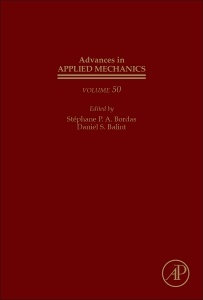Description
Advances in Applied Mechanics
Directors of collection: Bordas Stéphane P.A., Balint Daniel S.
Language: English
Subjects for Advances in Applied Mechanics:
Support: Print on demand
Description
/li>Contents
/li>Readership
/li>Biography
/li>Comment
/li>
Advances in Applied Mechanics, Volume 50, draws together recent, significant advances in various topics in applied mechanics. Published since 1948, the book aims to provide authoritative review articles on topics in the mechanical sciences. While the book is ideal for scientists and engineers working in various branches of mechanics, it is also beneficial to professionals who use the results of investigations in mechanics in various applications, such as aerospace, chemical, civil, environmental, mechanical and nuclear engineering.
1. Asymptotic Theory for Rayleigh and Rayleigh-Type Waves Julius Kaplunov and Danila A. Prikazchikov
Researchers in Mechanics, industrial research and development, graduate students and postdoctoral researchers.
Stéphane leads the Legato Team (legato-team.eu), a multi-disciplinary team of about 30 researchers of a dozen nationalities. He is focusing on bringing the rigour of mathematics to bring intuition into the behaviour of complex systems. In particular, he pioneered new approaches to guarantee the quality of surgical simulation devices.
The philosophy that he has been following is to create methodologies which translate across discipline boundaries. For example, the methodological backbone of his PhD thesis supports applications in fracture mechanics, nanoscale heterogeneities, biofilm growth, cancer growth, astrocytic metabolism and many others. Recently, his team has become involved, through the Institute of Advanced Studies of the University of Luxembourg in the nascent field of Computational Archaeology.
Currently, one of the main focus points of his Team is to bring machine learning tools to bear on mathematical models of physical phenomena. In particular, his group develops adaptive data assimilation, model selection and discretisation optimisation schemes for the deformation of soft matter under large deformation with applications to surgical simulations and robotics. His team has been applying such ideas to programmable matter, multi-scale material modelling, wind energy harvesting, chemical engineering process optimisation, among others.
Stéphane has taught over 5,000 students directly and given short courses and research seminars reaching thousands of attendees. He has extensive experience in one-to-one tutoring, mentoring and coaching across various disciplines. He has direc
- Includes contributions from world-leading experts that are acquired by invitation only
- Beneficial to scientists, engineers and professionals who use the results of investigations in mechanics in various applications, such as aerospace, chemical, civil, environmental, mechanical and nuclear engineering
- Covers not only traditional topics, but also important emerging fields
These books may interest you

Advances in Applied Mechanics 171.65 €

Advances in Applied Mechanics 182.55 €


